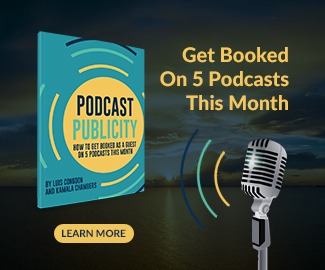Transform Your Life – Craig Perra
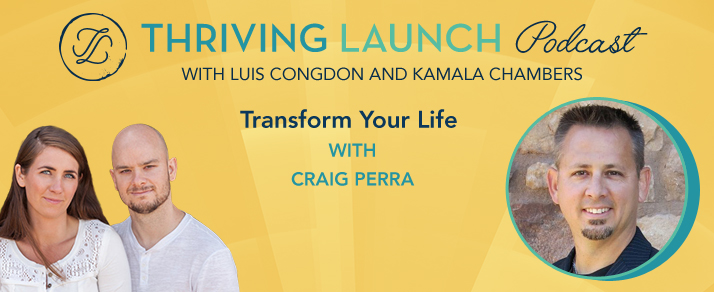
SUMMARY
On this episode, Craig shares with us the Trigger-Response Plan he created for people to stop addiction and recover from it.
Since we are creatures of habit, we must replace harmful habits with new, positive ones.
KEY TAKEAWAYS
![]() Addiction is triggered by self-loathing and the habitual need to numb, cope, and escape.
Addiction is triggered by self-loathing and the habitual need to numb, cope, and escape.
![]() To break a habit, you have to make a habit.
To break a habit, you have to make a habit.
![]() We’re creatures of habit.
We’re creatures of habit.
![]() The habit cycle is composed of a trigger, a thought, and an action.
The habit cycle is composed of a trigger, a thought, and an action.
![]() Bring awareness to the habit cycle by writing down your triggers, your thoughts, and your actions.
Bring awareness to the habit cycle by writing down your triggers, your thoughts, and your actions.
![]() All of our behaviors are a function of our unmet needs.
All of our behaviors are a function of our unmet needs.
![]() The responses you’re exhibiting today have been conditioned since you were a child.
The responses you’re exhibiting today have been conditioned since you were a child.
![]() It’s harmful to identify people as long-term addicts.
It’s harmful to identify people as long-term addicts.
TRANSCRIPTION: TRANSFORM YOUR LIFE – CRAIG PERRA

Luis Congdon
On today’s episode, we’re going to talk about how to stop addiction, how to recover, how to transform your life, and how to create new habits that empower us to a greater and better road.

Kamala Chambers
Today, we’re here with Craig Perra, known as the world’s top coach for people struggling with compulsive behavior. He also specializes a lot in sex and porn addiction. He’s been featured on The Steve Harvey Show, The Katie Couric Show, and a bunch of other places. We’re thrilled to have him here to help you transform your life.

Luis Congdon
Hey, Thriving launchers, we’re here with Craig Perra. We are here to talk about addiction, how to transform your life through the old school model that’s been around for a very long time. It’s worked for a lot of people, but it’s also falling short for some people around addiction.
How do we recover from addiction? How can you transform your life? What are some different models? I believe not everybody’s the same. The AA system and the various systems out there work for some and don’t work for others.
Regardless, this is not a show about knocking one’s system over the other. If you’re here to serve people and you’re here to help people, especially people recovering from any addiction, I salute you, and I salute the system that you love and support.
I want to bring on Craig to offer you a different model to transform your life. It’s something he’s worked with and allowed him to help a lot of people, and has put Craig on the map as one of the experts in addiction recovery.
So without further ado, Craig, are you ready to launch?

Craig Perra
I am ready to rock and roll and launch my friend. Thank you so much for having me.

Luis Congdon
Craig, I know you’re somebody who has struggled with addiction to lying, cheating, porn addiction, and drugs. It sounds like some stuff that I’ve also had in my personal life with drugs and lying.
If you’d end up getting addicted to drugs, there’s a whole gamut of stuff that comes with it and recovery is a hard path for so many people. Trying to transform your life is a tough road and finding something that works is tough because most people go back.
I’m curious from you. What are some of the steps to transform your life? What are some of the insights you’ve had around recovery and learning how to transform your life?

Craig Perra
I’m a function of the system not working. There are times I sometimes think to myself, “How dare I? A failed executive, life-coach challenge this disease base model.”
Journey To Transform Your Life

Craig Perra
When I was at my lowest point six, and half years ago, I tried to kill myself. I was fired from a six-figure executive job at Esurance, national responsibility, moved my family across the country for that opportunity, and large part because I got fired from my previous job. The drugs and the sex started to bleed over. It no longer was a hobby that I was able to contain. It began to bleed over.
You talked about lying. Before, I lied to my boss in my previous company about something stupid. He asked “Craig, did you do this?” and all I had to answer was, “Yes boss. I goofed. I made a mistake, ” and I said, “No.” The next day, I was fired.
The comeback kid, I get a better job making more money with more responsibility. I moved my family across the country. Within seven months, I’m in an inpatient drug facility after trying to kill myself snorting bath salt, if that gives you a sense of how low I sunk.
When I was seeking help, I would interview with a therapist and with a counselor. I just heard the same things over and over again like “Go to the meeting,” “Surrender,” “Be powerless.” Just the thought of doing that again, going to therapy, and talking about mom and dad again or talking about the pain in my past of being touched as a child, I just couldn’t do it.
I started to seek out alternative approaches, and in that journey, one of the first things I learned was the efficacy of this model that people were telling me that I had to do the professionals I was entrusted with my future and my family future was penniless. I was shocked to learn that 12 steps and according to a study from Cambridge, has a success rate of 10-20%. I went, “Oh my God. Wait a minute. There’s a whole another world.”
I got some great help from George Collins, who’s a provider of Walnut Creek, California, who started to introduce me to some Eastern concepts like meditating. I thought that might be helpful. Little did I know, here we are in the cosmos of this mindful revolution.
Habits Are Important To Transform Your Life

Craig Perra
I started to study habits, and I became obsessed with them. I became obsessed with them because I learned some very powerful things.
In this dark place, I’ve read Charles Duhigg’s book, The Power of Habit. I read a quote I’ll never forget. “Habits cannot be eradicated or erased. They must be replaced.”
I’ve always been a system’s guy, a system’s thinker, and that said to me that “Why am I obsessively focus on not doing the thing when the success is a function of me doing something else?”
Then, I also learned that these triggers we have as an addict is a trigger to self-deprecate, to use, and to act out weren’t going away. I said, “If those aren’t going away, then we have to incorporate that reality into the model instead of the shame and disgust I would feel every time I had what I now knew was this naturally occurring event.”
I became obsessed with habits, mindfulness, the science of success first, to put my life back together, then to build a better mousetrap, and help people recover quickly and in so, doing creative, sustainable infrastructure in their lives to support long-term success. That’s where The Mindful Habit was born.

Kamala Chambers
Wow! That’s such an incredible journey and a lot of courage to transform your life and find what’s going to work for you, and what’s proven for success with higher rates.
I’d love to know. What are some of the steps you recommend to start moving out of these habits to transform your life?

Craig Perra
That’s a great question.
I love starting clients in this place where I have them obsessed as they do over their addiction around their habit cycle.
We’re creatures of habits.
Understand The Habit Cycle To Transform Your Life

Craig Perra
Scientists say that we spend 50% of our waking hours, automatically, instantaneously reacting to external stimuli. We’re programmed like computers. That negativity manifests itself every time through this habit cycle.
The triggers we experience, that energy shift in the body from positive to negative when we screw up, make a mistake, see something that might trigger our addictions, these triggers aren’t going away. I want my clients to understand and learned this cycle they experience.
Then, after these triggers to the addict, come the thoughts, that mental chatter, self-deprecating, self-loathing, and using.
Then, what comes next is action. We go through this cycle; trigger, thought, action again and again.
First Step To Transform Your Life

Craig Perra
The first phase of the process to transform your life is to bring a level of awareness to this cycle literally by tracking your triggers, your thoughts, and your actions for seven days. Write them down. What triggered you? What put this in motion? You’re going to find there are all sorts of different things.
Many times, the addict finds that it’s not the thing, the substance, or the act, or the behavior that’s triggering them.
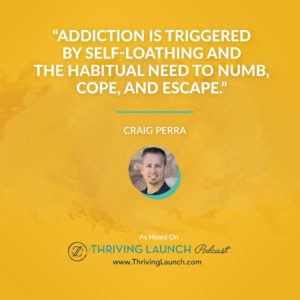
Transform Your Life by Understanding How Negativity Manifests

Craig Perra
Understand how the negativity manifests itself in your life through these habits cycle, these triggers, then these thoughts that follow, and pay very careful attention to those thoughts. Literally, like a court reporter or a journalist transcribing them.
What exactly is that mental chatter that’s framing your reality, and that’s habitually framing your reality? And then, what action do you take?
Create Space To Transform Your Life

Craig Perra
Once you understand the cycle, now, you have an ability to create space. That space, that moment, that hiccup, that speed bump, and that at the moment mindfulness exists between thought and action.
The cool part about it is what the addict is doing that which drove them insane, those triggers and those thoughts. Those triggers and thoughts don’t go away. I still self-deprecate.
I was walking on stage at the Steve Harvey Show, and I look over. I see a beautiful woman sitting in the audience, and my first thought was, “Oh my God. There’s a prostitute.” What? There’s no prostitute. Yes, all the prostitutes get together in the afternoon and watch the Steve Harvey Show. That was fear. That was the numbing, coping, and escaping like “Uh oh. There it is. Let’s get away from this.”
Use The Triggers To Transform Your Life

Craig Perra
Instead of feeling shame or disgust, recognize that this trigger doesn’t go away. You can now use it to empower yourself.
Recognize that energy shift and those thoughts and then do something different.
The first step of the process to transform your life is mastering that habit cycle and understanding exactly how that negativity is manifesting itself in your life by obsessively paying attention to that cycle, and tracking it for seven days. Literally, writing down the trigger, thought, and action.

Kamala Chambers
This is so amazing because what you’re doing is we’re bringing all the shadow and all the things driving us that are completely unconscious. You’re bringing them to the light.
We have an opportunity to see what’s going on underneath the surface rather than just what we think is going on or even worst, is just doing things completely out of compulsive and not having an idea of what’ driving us underneath.
What do we do with this? What do we do when we have this data, and we’ve brought the awareness to the behaviors?

Craig Perra
Once you’ve got the data, now, you can do something about it to transform your life.
Transform Your Life By Doing Something Different
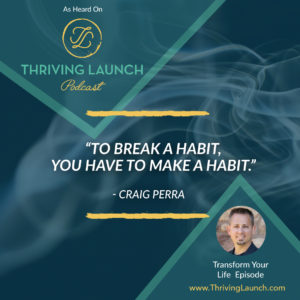

Craig Perra
That has become so deeply entrenched in my psyche. It’s so much more than a cute internet meme or a cliché. It is a matter of scientific fact.
If you are going to counterbalance decades of negative habitual thinking, and acting out, numbing, coping, and escaping behavior, you have to do something different.
What I teach clients is once they developed an awareness of that habit’s cycle, I teach them about this concept of space.
Viktor Frankl, Holocaust survivor, founder of Logotherapy, author of Man’s Search for Meaning, talked about this idea of space in his book when he said, between stimulus and response, and that’s the trigger. The response is the action between stimulus, and in response, there is a space.
In that space lies our power to choose our response. In our response lies our growth and our freedom. This sentence was uttered decades before we have the neuroscience research we have on the brain because that stimulus doesn’t go away. How do we respond?
Transform Your Life Using The Trigger Response Plan

Craig Perra
You can use your awareness of those triggers and those thoughts to cue a different action to transform your life, and that different action I teach is a trigger response plan. That is a series of five steps the client can do to interrupt practically that pattern.
Here’s the part I love about the system because the customer starts first in a very practical way seeing their ability to regain some power just by paying attention, being mindful of their habit cycle.
As they’ve been paying attention those thoughts, what we do next is ask “Who said that? Where did that thought come from? In the universe of ideas, why, when I tripped on the sidewalk in front of people, my first thought is, “You piece of S-H-I-T.” Why that thought?” We Use those bread crumbs to do a real deep dive on the cause.
Where did these habits come from? Why the numbing, coping, and escaping strategy?
Transform Your Life Using The Sub-Personalities Concept

Craig Perra
We use this concept called subpersonalities, which are the separate and distinct parts of ourselves. The client can learn to “Who is this addict? Where did he come from and what does he need?
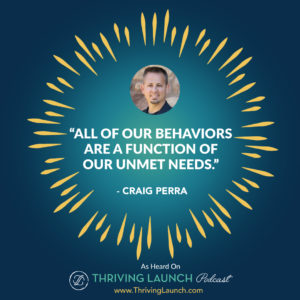

Craig Perra
It may be incredibly unhealthy, but it’s doing something for the addict. Those needs have to be understood and have to get met in a healthy, constructive way.
Simultaneously, while we’re going back, we’re using the data we’ve acquired from those thoughts to do that cause from a very practical perspective. How is the negativity of the past habitually manifesting itself in the present?
This trigger response plan is something I just came up with for me because I kept getting triggered. I kept having thoughts. Once I accepted their reality, I came up with this five step triage plan that I teach the clients and ultimately, they use it, or they create their own, but it’s very simple.
Transform Your Life – Wrong thought, Right

Craig Perra
The first step is “Wrong Thought, Right.” That’s a cognitive behavioral thought replacement tool, and that’s like I caught the hiccup or the speed bump.
As soon as you’re aware of that negative thinking, instantly to erase the wrong, insert the right thought, and that maybe it. That might be enough to shift that energy. More often than not, at least for me, it wasn’t so I go on to step two.
Transform Your Life Through Aversion Therapy

Craig Perra
The step two is where I embrace this form of aversion therapy, and I’d snap this elastic band that I have on my wrist. I didn’t know it was aversion therapy at that time. I just will snap it because it felt like the right thing to do, and then wrong thought, right, and snapped back to reality.
Then this third step, five deep mindful breaths. We all know the power of the breath and mindfulness. Sitting and breathing are changing the way. We are treating mental health all over the world for good reason because it’s efficacy is very high so says science time and time again.
Transform Your Life Through Breathing And Engaging The Body

Craig Perra
90-80% of the time you’re good at mindful breathing. You’ve been able to reset that energy, regain control, create that space, and embrace your power of choice. If that doesn’t work, you can proceed to step four.
Step four is doing jumping jacks, push-ups, screams, and some way to engage the body because that means that the energy shift was so powerful. The wrong thought right that snapped back to reality and those mindful breaths weren’t enough. You had to do something else.
Connection Helps Transform Your Life

Craig Perra
The last step, which is step one in other modalities. The reason why its final is because no one ever takes advantage of step one. Just call somebody. Connect with someone to transform your life.
I’ve had clients called their bankers. I’ve had clients call me. It doesn’t matter.
Just create that human connection because every addict knows there’s no acting out when you’re connected.

Luis Congdon
I’m putting my banker on speed dial.

Craig Perra
Yeah, put your banker on speed dial.
What my client did since he didn’t know who to call, he said, “You know what? I got some business to do.” So he called his banker, and they had a conversation. “How are the kids? How’s the family? I don’t know anything about you. Tell me something about you.” Then, they got down to business, and they did their thing. By the time he was done with that call, his energy had reset, and he had regained control.
The problem is I learned that to call somebody is the first thing you do. There’s a reason why they call it the 2000 pound phone because nobody picks it up. It’s so damn heavy.
Transform Your Life By Making A Plan

Craig Perra
So I put that step at the end when hopefully, you’ve been able to create enough space through doing something, shifting that energy to create the capacity to call somebody if you need to reach out. That’s essentially the trigger response plan, which I call Risk Management 101.
I come from a business background. If you know something bad is going to happen, then you got to plan for it.

Luis Congdon
You better get ahead of it.

Craig Perra
You better get ahead of it. This realization that these triggers aren’t going away was life changing for me. I wept when I learned that because I would drive home from the therapist having this in-depth session. No job, living in an apartment, not sure where the next check is coming from, my wife was accustomed to a real high standard of living, and there’s nobody within 50 miles who wants to employ direct compliance at the level I was at.
I had to do something. I had to take action.
Creating Positive Growth Can Transform Your Life

Craig Perra
By creating this space, by realizing that these triggers aren’t going away, then that means systematically, you have to use them to create positive growth.
I had a pilot client say it best. I love this quote. He says, “You don’t see aviation engineer sitting around complaining about gravity, do you? And neither should we about our triggers because they’re a gift. They’re an opportunity to wake up and use that which drove you crazy. Maybe to your lowest place, use that as an opportunity to create that in the moment mindfulness so you can embrace that power of choice that we all have if we know the tools.”

Luis Congdon
Somehow, this makes me think of something then I remember hearing Thich Nhat Hanh who is very well-known for mindfulness and a Buddhist. I’m sure a lot of you know who he is.
Use The Trigger To Create A Different Outcome And Transform Your Life

Luis Congdon
One of the things he said is he would get rattled when he heard his phone. When his phone would ring, it would shake him a little bit, and he decided that his phone ring was going to be a trigger for him to become more mindful. So when his phone would go off, he would take a few deep breaths, then he would answer the phone.
In some ways, you’re saying the same thing. I resonate with what you’re talking about triggers not going away. Even years after you’ve gotten over the addiction and the craving, the trigger is still there.
One of those triggers for me for a long time was a lighter going off. When I heard a lighter, a part of me would be triggered. I would want a cigarette or I would want to smoke something. It took work for me to say that that trigger is now going to be a reminder that I’m healthy.
When I hear a lighter, I’m going to take a few breaths and remind myself that I’m committed to health, that I’m interested in being healthy and that it’s okay that other people are doing that, but I’m choosing something different.

Craig Perra
That’s beautiful.
What you did there is you used that trigger to prompt a different outcome to transform your life.
You’re right. They don’t go away.
Deal With The Cause To Transform Your Life

Craig Perra
Here’s the thing. I have never worked with a single client whose number one problem was using the thing whether it would be sex, drugs. Every client comes to me with that belief, but within 30 days, we shattered that because what they see behind the mask of an addict, once you engaged this part of you and you learn “Who is an addict? Where did the addict come from?”
You see that these responses you’re exhibiting today have been conditioned since you were a child for the ever single person I’ve worked with.

Luis Congdon
One of the things you bring up is great. You’ve mentioned this analogy of a tree. We tend to look at a tree and the fruit and say, “This fruit’s not very good, so we need to spray something. The issue is the fruit. Let’s work on the fruit. Let’s just spray the top of the tree with some growth stuff, so the fruit does better.”
The real fixer is going into the roots of the tree, nurturing the ground of the tree, and giving nurturance to that tree.
Avoid Labeling Yourself To Transform Your Life

Luis Congdon
I have one last question here as we begin to wrap up with you. In all sorts of rehab treatments, recovery treatments, one of the things they talk about is once you’re an addict, you’re always an addict.
I don’t claim to be a professional. I don’t have a Master’s in recovery. I have worked with a lot of people in recovery. I’ve been in nonprofit before being in this line of work. I spent over ten years in the nonprofit world primarily working with individuals who are homeless and people who are in recovery.
I’m curious from you because I’ve never resonated with this idea that once you’re an addict, always an addict. I remember when I heard Anthony Robbins say that too. He said, “I don’t believe that’s a good frame to put on people.” I resonated with that. I know that butts against the wisdom that a lot of fantastic people are teaching. What’s your insight on that?

Craig Perra
They’re wrong, and you’re right.
Transform Your Life Using A Different Approach

Craig Perra
I believe, firmly, in the lives of my children, and I think that science will bear this out. I believe it already is, so there’s a revolution in the addiction space. As you know, approaching it from a different perspective, mindfulness, tools, teachings, techniques vs. labeling yourself for the rest of your life as the worst part of you.
Surrendering, powerlessness, I’m an addict. Goodness, gracious. No! Goodness gracious, that’s terrible!
I believe that it is inherently harmful to identify as the worst part of yourself primarily. I think it’s terribly unhealthy. Does that mean we forget? Not! Goodness, gracious, but that doesn’t mean you identify yourself this notion of a disease. That’s a made up concept.
You will find just as many neuroscientists saying that the data around addiction in the brain is [huy]. You’ll find a whole bunch of other saying it is black letter science. It’s golden.
What I find when you’ve got so many people with opposite extremes, probably, they both have certain elements of truths to it.
But to answer your question, I agree with you. Luis, it is inherently harmful to identify as an addict long term. It doesn’t mean you forget, but I believe it is detrimental. I think the literature continues to test the efficacy of the different models.

Luis Congdon
I love it. We’ve been here with Craig Perra with some groundbreaking insights into addiction, addiction recovery, finding wholeness to transform your life.
Something I encourage you all to look at with your life is to find some trigger in your life whether it’s the alarm clock going off or your boss says something to you, or you get a notification from an email or your phone rings.
Find something in your life that you can utilize as a trigger for you to ground yourself into some new reality. We can use that example of the phone ringing. One of the exercises I love is that when the phone goes off, I just take two deep breaths. I’d say “Thank you” in my mind, and then I’d pick up the phone, and it’s been an incredible exercise.
I encourage you to find your version of that to transform your life. Find some new trigger.
We’ve been here with Craig, talking about recovery, finding wholeness, and finding yourself once again to transform your life.
Thank you so much, Craig for joining the show, and as always, go out and thrive you all.

Craig Perra
Thank you so much. It’s a privilege.


